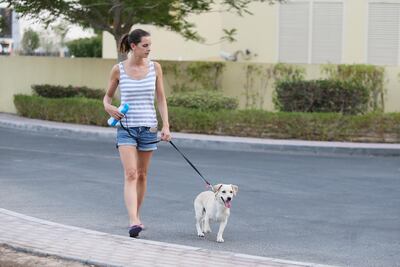There is a long-standing theory among UAE residents: move here, gain a stone. For some, it happens quickly, the result of one too many extravagant brunches and a smorgasbord of delicious cuisines at your doorstep. For others, the "Dubai stone" is a little harder to explain.
Of course, moving to a new country will disrupt anyone’s routine, especially when you spend the first few weeks living in hotels or temporary accommodation. However, several people report experiencing the unwelcome phenomenon despite continuing with a healthy diet and tried-and-tested workout plan. It turns out, we’ve all been sitting on the answer all along.
Neat, or non-exercise activity thermogenesis, is the part of the weight-loss puzzle that is often overlooked, says Chris Beavers, deputy gym manager at Ultimate Performance Dubai. While it may sound technical, Neat refers to the amount of energy used through regular daily activities, aside from exercising and sleeping. This can include walking the dog, carrying groceries home, playing with your children and climbing the stairs. However, many of us live and work in high-rises, and end up taking the lift more often than not. The same goes for driving yourself or ordering a cab – over waiting for a bus – and having groceries delivered. And although there are walking and cycling tracks in select areas, the UAE is not exactly a pedestrian-friendly country, not least in the summer.
As it turns out, increasing Neat levels is one of the single largest variables we can control when it comes to managing our weight, and can contribute between 15 and 50 per cent of a person’s total daily energy output. Further, your energy expenditure has to be greater than your energy intake.
“Humans have [been built] to be active and on the move throughout the day, but our modern lives see us moving less and sitting more, whether that’s at a desk at work, behind the wheel of a car or at home on the sofa watching Netflix,” Beavers says. “Most people try to offset the hours spent sedentary with time in the gym. But your exercise session will only contribute so much to your total daily energy expenditure. It’s what you do activity-wise in the other 23 hours of your day that have a much bigger impact on your overall energy [output].”
The power of Neat was highlighted recently by researchers at the University of Texas. After studying the patterns of 10 fit and healthy participants, the team found that sitting at a desk all day could undo the hard work you put in at the gym. The study was published in the Journal of Applied Physiology, and concluded that people who sit for 13 hours a day, and take fewer than 4,000 steps on average, are more likely to develop problems with their metabolism – even if they exercise. Staying still for extended periods of time may create conditions within our bodies that "make us resistant to the usual metabolic improvements after acute exercise", says Dr Edward Coyle, professor of kinesiology at the University of Texas and lead author of the study.
The difference in the calories burnt between someone who is active all day and someone who is sedentary can run into the hundreds, with some estimates putting the variation as high as 2,000. "While exact figures will vary depending on your bodyweight and how vigorously you move, sitting for an hour will burn roughly five calories, standing will burn 15 calories, whereas walking [at an average speed of five kilometres an hour] can burn more than 230 calories an hour," explains Beavers.
"We advise many of our business clients to take calls or meetings on foot, walk during lunch breaks, take the stairs to the office, get off public transport a few stops early, or park their car further away and walk the rest of the way," he adds. "Away from the office, we advise starting your day with some light exercise, like a bodyweight circuit, going for a walk before or after dinner, and calling friends or listening to a podcast all while walking."
Excessive sitting is a relatively new health problem in human history, yet one that most people don’t even think about. Less than 200 years ago, 90 per cent of the world’s population lived in agricultural communities, and spent most of the day on their feet. People sat only for three to five hours each day, when taking a break from physical labour. The average time spent sitting for many modern workers is now 13 to 15 hours daily.
Aside from affecting weight loss, staying sedentary also causes other health problems. When you sit for long periods without moving major muscles, those tissues become less sensitive to insulin, the hormone that regulates blood sugar. This insulin resistance raises the risk for type 2 diabetes, which is linked to heart disease. Spending long, uninterrupted hours in front of a computer screen can also create tension in your neck and shoulders, according to a Harvard Health report. This physical stress may trigger mental stress, raising blood pressure and leading to a host of other problems.
While it can be hard to move constantly, especially when the weather stops us from spending significant periods of time outside, Beavers suggests there are a number of ways to build daily activity even during the summer. “One of the simplest ways is to find a big enclosed space, such as a mall, to walk around or do your shopping while getting your steps in. Try to visit shops at opposite ends of the mall and plan the longest route possible to maximise your step count.”
Beavers adds that clients who find ways to build more activity into their day, on top of a healthy diet and high-impact exercise, are far more successful in shifting the Dubai (or Abu Dhabi) stone. “These little bits of activity through the day soon add up.”



